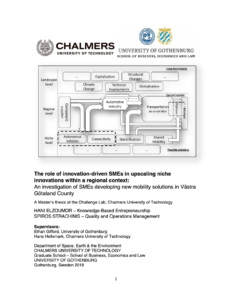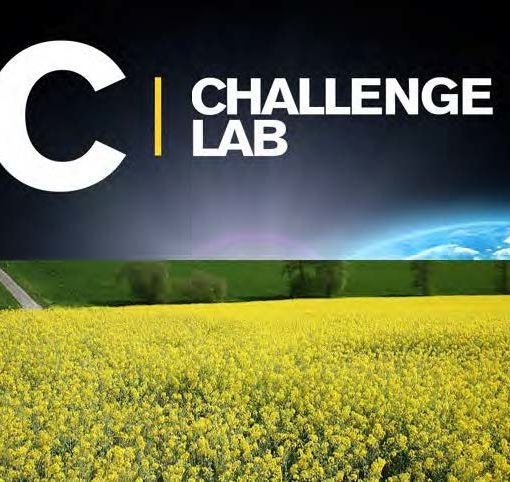HANI ELZOUMOR & SPIROS STRACHINIS (2019)

The issue of sustainability transitions of socio-technical systems (STS), despite being thoroughly discussed in literature, still has a lot of work to be further investigated, specifically from multi-level actor-based perspective. This study has a general aim to empirically investigate sustainability transition of mobility system of Västra Götaland County, by adopting theory of system innovations, put by Frank W. Geels, and a co-evolutionary approach of transition. As a system niche actor, Small and Medium Sized Enterprises (SMEs), that are innovation driven and developing new technological solutions, can be a source of disruptive and radical innovations, and hence a significant player in the process of sustainability transition in this regional context. In that regard, this thesis has the following overarching research question: what is the role of innovation-driven SMEs developing new mobility solutions in upscaling niche innovations within a regional context? To answer this question, the role of innovation-driven SMEs, located in Västra Götaland County, is explored by identifying their “current” and “perceived” roles, respectively. This study follows a qualitative strategy in which a comparative design is adopted. In addition, primary and secondary sources have been accessed to collect relevant data. In order to collect primary data, we identified population of innovation-driven SMEs developing new mobility solutions in Västra Götaland County, and then selected a sample of 9 SMEs to conduct semi-structured interviews. Primary data from 6 industry experts and researchers in the region were collected as well through unstructured interviews. SMEs were classified, under the comparative design, on four technological trends that have the potential to disrupt mobility systems and they are (a) autonomous vehicles, (b) connectivity, (c) electrification and (d) shared mobility. Results of SMEs population showed the existence of other technological trends that are not high-tech but service-based and sustainability-oriented, and they were included in the analysis. A qualitative thematic analysis has been conducted to decide on major themes of SMEs current and perceived roles based on findings of selected sample and industry experts. Accordingly, this study has found that SMEs current role is significantly and positively contributing to the system’s transition towards sustainability. The latter role can be classified under three pillars; the creation and maintenance of specialized niches, forming symbiotic relationships with regime incumbents and undertaking active collaboration with various stakeholders on both regime and niche levels. However, current system bottlenecks represented into incumbents’ inertia, as well as SMEs shortcoming regarding absence of sustainability-rooted strategies for scaling up their niche technologies, can put the whole transition process under risk of failure. That motivated SMEs perceived role based on their potential 6 of realizing disruptive effect of niche technologies. Again, by dividing such role into three interconnected sub-roles, SMEs have to adopt more co-innovation of their business models with relevant regime stakeholders, follow new forms of technology diffusion/scale-up rather than traditional business growth, and engage into more articulation of regime challenges and more direction of collaboration activities’ goals. Lastly, VGR has a decisive role to assist SMEs scaling up their innovations, besides its traditional function to provide financial and mentoring support, by exerting more pressuring on regime influential stakeholders to open-up for real collaboration, and by the implementation of bridging policies that aim for more integrative innovation strategies between SMEs and regime incumbents.




